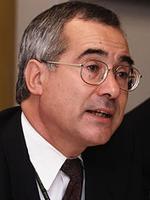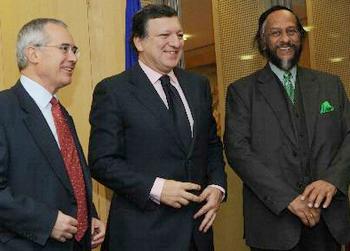Copenhagen Offers '50-50 Chance' of Averting Dangerous Global Warming
LONDON, UK, December 3, 2009 (ENS) - The world has a "50-50 chance" of avoiding global warming of more than two degrees Celsius, the threshold for dangerous climate change, if a strong political agreement can be reached at the United Nations conference in Copenhagen, and then implemented, says Lord Nicholas Stern, an economics and climate expert at the London School of Economics and Political Science. But, he says, a total of governments' most ambitious emissions reduction targets stated so far still fall short of that goal.
The UN meeting in the Danish capital from December 7-18 will attempt to forge a deal to limit global greenhouse gas emissions after 2012, when the first commitment period of the Kyoto Protocol expires.
 |
Lord Nicholas Stern (Photo courtesy World Bank) |
The British economist and former secretary of the treasury said, "To do this we need to halt and reverse the growth of annual emissions of carbon dioxide and other greenhouse gases, reducing them from about 47 billion tonnes in 2010 to about 44 billion tonnes in 2020, and decreasing to much less than 20 billion tonnes in 2050."
"If you add up the most ambitious of the intentions to reduce emissions that have been expressed so far, they are, if delivered, around two billion tonnes higher than the overall 2020 goal," Lord Stern said Wednesday.
Stern is basing his sense of the situation on a scientific and economic assessment of the range of paths for global annual emissions that are consistent with a 50 percent chance of avoiding a rise of more than two degrees Celsius. The analysis was conducted at the Centre for Climate Change Economics and Policy, which he chairs.
All of these paths "pass through a window of between 40 and 48 billion tonnes in 2020 and then decrease to between 14 and 17 billion tonnes in 2050," said assessment co-author Dr. Nicola Ranger.
"In view of the risks from delayed action and the economic benefits of acting early, it would be smart to aim towards the bottom of this window in 2020," she said.
Assessment co-author Dr. Alex Bowen said, "It appears entirely feasible to lower global annual emissions to 44 billion tonnes or below by 2020 if effective policies are introduced now and countries take advantage of low-hanging fruit such as energy efficiency measures."
"However," said Bowen, "weak or delayed action to reduce emissions in the near term would require much stronger cuts after 2020, which would be likely to increase significantly the economic costs of meeting a 2°C target, and might make it impossible."
"Although we are making some progress on commitments for cuts in greenhouse gas emissions, a major challenge is for rich countries to provide sufficient financial support to help developing countries to reduce their emissions and to adapt to those impacts that cannot now be avoided," said Lord Stern, a former chief economist at both the World Bank and the European Bank for Reconstruction and Development, known for his 2006 study "The Economics of Climate Change: the Stern Review."
"The rich countries should find US$50 billion, or about 0.1 percent of their gross domestic product, a year by 2015 to help the developing countries, over and above existing commitments on development aid," Stern advised.
The European Union can continue to show leadership on climate change by positioning itself at the forefront of what Stern calls "the dynamic and exciting transition to a low-carbon economy" by highlighting its readiness to commit to its stronger target of reducing emissions by 30 percent by 2020 compared with 1990.
 |
From left, Lord Nicholas Stern, President Jose Barroso and Dr. Rajendra Pachauri meet in Brussels. December 3, 2009. (Photo courtesy European Commission) |
Today in Brussels, European Commission President Jose Barroso met with Lord Stern and Dr. Rajendra Pachauri, who heads the Intergovernmental Panel on Climate Change.
"We are approaching the moment of truth at Copenhagen. Words are no longer enough – now we need to see commitments from all sides," Barroso said following the meeting. "I want a simple, understandable and clear text coming out of Copenhagen that is politically binding on all countries while reflecting our common but differentiated responsibilities."
"We won't get a treaty, that is clear, but we have to light the pathway to a legal agreement that will respect the 2 degrees limit, Barroso said.
President Barroso indicated that the political will around the world could become strong enough to achieve an effective agreement in Copenhagen.
"This is not the moment to be optimistic or pessimistic. But we have clear signs that the different communities are fully engaged – NGOs and climate campaigners, of course," Barroso said, "but also business leaders who I recently met here who have been urging us to reach an ambitious deal. World leaders are now fully engaged after being brought into the process in September in New York."
In the past few weeks, Barroso and Swedish Prime Minister Fredrik Reinfeldt and have traveled to Washington, Delhi and Beijing for climate change meetings with President Barack Obama, Prime Minister Manmohan Singh and both President Hu Jintao and Premier Wen Jiabao. In Stockholm, they met with Russian President Dimitry Medvedev and Brazilian President Luiz Lula da Silva.
"I'm encouraged by the commitment of around 90 leaders to attend Copenhagen," Barroso said. "The growing readiness to put concrete numbers on the table is also encouraging - most recently, China's announcement of carbon intensity target is a significant step, another major developing country coming forward with a clear commitment."
Only time will tell whether this momentum will be enough to bring the right level of offers to the table, said Barroso. "My acid test for Copenhagen is not whether there will be numbers but whether each major player has gone to the outer limits of their capacity, whether we have reached the highest level of ambition possible."
"I remind everyone that Europe is ready to put 30 percent in the table but only if there are significant commitments from developed countries and adequate contributions from developing countries," said the European president. "We cannot commit now to more if others do not move as well."
Lord Stern said, "An agreement now lies in the hands of world leaders who can make decisions across the full range of political issues that relate to climate change. They must demonstrate determination and vision. We must have an agreement that will ensure future generations can enjoy the opportunities for sustainable growth that are offered by the low-carbon economy, and that are free from the severe risks that would arise from unchecked climate change. We cannot afford the cost of failure on climate change."
2009. Copyright Environmental News Network To subscribe or visit go to: http://www.enn.com